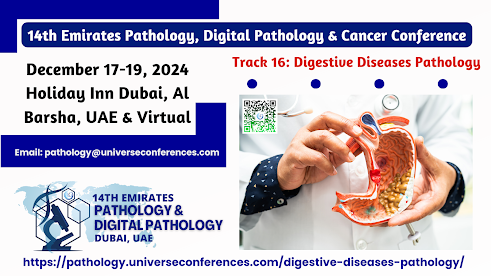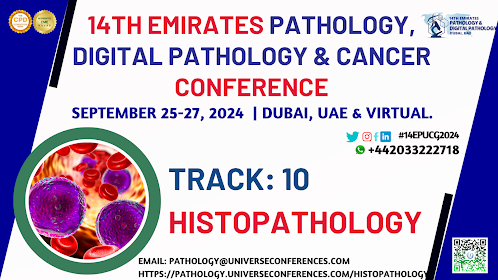Track 16 Digestive Diseases Pathology
Digestive diseases pathology, also known as gastrointestinal pathology, is a subspecialty within the field of pathology that focuses on the study of diseases affecting the digestive system. This includes the organs of the gastrointestinal (GI) tract, such as the esophagus, stomach, small intestine, large intestine (colon), liver, gallbladder, and pancreas. Pathologists specializing in digestive diseases pathology analyze tissues and cells from biopsy samples, surgical specimens, or autopsies to diagnose and understand the pathology of various gastrointestinal conditions.
1.
Inflammatory Bowel Diseases (IBD):
Conditions such as Crohn's disease and ulcerative colitis involve chronic
inflammation of the gastrointestinal tract, leading to various clinical
manifestations and complications.
2.
Gastrointestinal Cancers: Pathologists study the pathology of cancers affecting the GI tract,
including esophageal cancer, gastric (stomach) cancer, colorectal cancer, liver
cancer, and pancreatic cancer.
3.
Liver Diseases: This
includes a broad range of liver disorders, such as hepatitis, cirrhosis, and
liver tumors.
4.
Gastrointestinal Infections:
Pathologists investigate the histopathology of infectious diseases affecting
the GI tract, caused by bacteria, viruses, parasites, or fungi.
5.
Gastrointestinal Motility Disorders:
Conditions affecting the movement of the digestive system, leading to symptoms
like dysphagia (difficulty swallowing) or gastroesophageal reflux disease
(GERD).
6.
Malabsorption Syndromes:
Disorders that interfere with the absorption of nutrients in the GI tract, such
as celiac disease.
7.
Gastrointestinal Bleeding Disorders:
Pathologists examine tissues to identify the cause of
gastrointestinal bleeding, which can be due to ulcers, vascular malformations,
or tumors.
8.
Pancreatic Diseases: This includes inflammation of the pancreas (pancreatitis) and pancreatic
tumors.
Pathologists
in this field use various techniques, including gross examination, microscopy,
and molecular pathology, to analyze tissues and provide accurate diagnoses. The
information gathered by gastrointestinal pathologists is crucial for guiding
patient management, treatment planning, and understanding the underlying
mechanisms of digestive diseases.
Clinical
gastroenterologists, surgeons, and other healthcare professionals often
collaborate with gastrointestinal pathologists to provide comprehensive care
for patients with digestive system disorders. Advances in this field contribute
to improved diagnostic accuracy, better prognostication, and the development of
targeted therapies for gastrointestinal diseases.
Conference Name:
14th Emirates Pathology, Digital Pathology & Cancer Conference
Short Name:
14EPUCG2024
Dates: December
17-19, 2024
Venue: Holiday Inn
Dubai, UAE & Online
Email:pathology@universeconferences.com
Visit:https://pathology.universeconferences.com/
Submit here:https://pathology.universeconferences.com/submit-abstract/
Call Us:
+12073070027
WhatsApp us athttps://wa.me/442033222718?text=
#DigestivePathology
#GastrointestinalPathology #DigestiveDiseases #GIPathology #ColorectalPathology
#LiverPathology #PancreaticPathology #EsophagealDisease #PathologyResearch
#Gastroenterology



.png)
Comments
Post a Comment